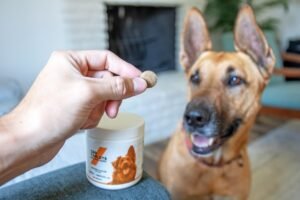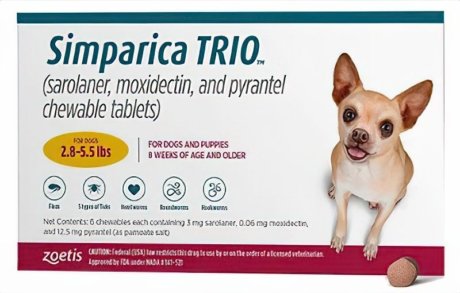Giardia in Dogs | Symptoms, Treatment, Natural Remedies and More
Giardia, a microscopic protozoan parasite, poses a significant threat to the health of our beloved canine companions. To fully grasp the implications of this parasitic infection, it is essential to delve deep into its various facets. In this comprehensive guide, we will thoroughly examine every aspect of Giardia in dogs, offering a detailed understanding of this often underestimated condition. From its intricate causes and wide-ranging symptoms to comprehensive prevention and multifaceted treatment strategies, we will leave no stone unturned, ensuring the well-being of your furry friend.
Understanding Giardia: The Basics
Giardia is a microscopic protozoan parasite belonging to the genus Giardia. This tiny, single-celled organism thrives in the intestines of mammals, including dogs. Giardia manifests in two primary forms: the resilient cyst and the delicate trophozoite. When a dog ingests the cyst form, it releases trophozoites in the small intestine, where they attach to the intestinal lining and initiate an infection.

Transmission: How Do Dogs Get Infected?
To comprehend Giardia fully, it’s crucial to grasp its modes of transmission. Dogs typically contract Giardia by ingesting contaminated water, food, or feces. The parasite’s remarkable resilience allows it to persist in the environment for extended periods, contributing to its wide transmission potential. Thus, dogs can acquire the infection from various sources, including stagnant water, communal dog areas, or unsanitary living conditions.
Recognizing Giardia Infection: Symptoms Unveiled
Recognition of Giardia infection is pivotal for timely intervention. However, Giardia’s symptoms can vary significantly, and sometimes, they may not even manifest. To aid in identification, let’s explore the common signs:
1. Diarrhea:
Giardia-infected dogs often experience diarrhea, which can be sudden, frequent, and occasionally explosive. This persistent diarrhea can lead to dehydration if not addressed promptly.
2. Vomiting:
Giardia infections may induce vomiting, accompanied by feelings of nausea and a noticeable loss of appetite.
3. Weight Loss:
Giardia’s presence can lead to malabsorption of nutrients, resulting in gradual weight loss.
4. Lethargy:
Affected dogs may display signs of fatigue and reduced activity levels, indicating discomfort and illness.
5. Dehydration:
Continuous diarrhea and vomiting can lead to dehydration, a severe concern that necessitates immediate medical attention.
Giardia Symptoms In Dogs
Giardia is a protozoan parasite that can infect dogs and cause a condition known as giardiasis. The symptoms of giardia in dogs can vary in severity, and some infected dogs may not show any signs at all. When symptoms do occur, they typically involve the gastrointestinal system. Common symptoms of giardia in dogs include:
- Diarrhea: One of the most prevalent signs of giardiasis is diarrhea. The stool may be soft, watery, and foul-smelling. In some cases, it can be intermittent, and the dog may have alternating periods of diarrhea and normal stool.
- Vomiting: Dogs with giardia may experience vomiting, which can sometimes be persistent or intermittent.
- Weight Loss: Chronic giardiasis can lead to weight loss, as the dog’s body may have difficulty absorbing nutrients from food due to the intestinal damage caused by the parasite.
- Dehydration: Diarrhea and vomiting can lead to dehydration. Signs of dehydration may include lethargy, sunken eyes, and dry gums.
- Lethargy: Infected dogs may appear tired, listless, or less active than usual.
- Abdominal Discomfort: Some dogs may show signs of discomfort or pain in the abdominal area. They might exhibit hunching or reluctance to be touched.
- Increased Gas: Dogs with giardiasis might experience increased flatulence due to the presence of the parasite in the gastrointestinal tract.
- Mucus in Stool: The stool may contain mucus or appear greasy.
How Is Giardia Spread In Dogs
Giardia in dogs is caused by a protozoan parasite called Giardia duodenalis. This parasite primarily infects the gastrointestinal tract of dogs and can be spread through various means. Understanding how Giardia is transmitted is important for preventing and managing infections. Here’s how Giardia is spread in dogs:
- Fecal-Oral Route: The most common way that Giardia is spread is through the fecal-oral route. This means that a dog becomes infected by ingesting the cysts (a dormant and hardy form of the parasite) that are shed in the feces of an infected dog.
- Contaminated Water: Dogs can become infected by drinking water from sources contaminated with Giardia cysts. This is often a concern when dogs drink from puddles, streams, or other natural water sources.
- Direct Contact: Giardia can be spread from one dog to another through direct contact with infected feces. This can happen when dogs come into contact with contaminated soil, grass, or objects that have been soiled with infected feces.
- Grooming: Dogs may ingest Giardia cysts while grooming themselves if they have come into contact with contaminated surfaces.
- Contaminated Food: While less common, it is possible for dogs to become infected with Giardia through the ingestion of contaminated food. This can happen if the food comes into contact with infected feces or contaminated water during preparation or storage.
- Housing Environments: Giardia can be more prevalent in environments where dogs are kept in close quarters, such as kennels, shelters, and doggie daycares, where there is a higher risk of fecal contamination.
Giardia In Dogs Treatment
Giardia in dogs is a common gastrointestinal parasite infection that can cause symptoms such as diarrhea, vomiting, and weight loss. It’s essential to address giardiasis promptly to alleviate these symptoms and prevent the spread of the parasite. Treatment typically involves a combination of medications and hygiene measures. Here’s how Giardia in dogs is treated:

- Medications: Veterinarians often prescribe specific medications to eliminate Giardia parasites from the dog’s gastrointestinal tract. Commonly used medications include metronidazole and fenbendazole. Dosage and treatment duration will be determined by your veterinarian based on your dog’s condition.
- Hydration: Diarrhea and vomiting associated with Giardia can lead to dehydration. Ensure your dog has access to clean, fresh water at all times, and monitor their water intake to prevent dehydration. In severe cases, your veterinarian may recommend fluid therapy.
- Nutrition: Maintain a balanced and easily digestible diet for your dog during treatment. Some dogs with giardiasis may experience a loss of appetite, so it’s important to offer palatable and easily digestible food to prevent further weight loss.
- Environmental Cleaning: Giardia cysts can persist in the environment, so it’s essential to thoroughly clean and disinfect areas where your dog has been. Clean water and food bowls, bedding, toys, and any surfaces your dog has come into contact with. Dispose of feces promptly and appropriately.
- Preventative Measures: To prevent reinfection or transmission to other dogs, ensure that your dog is well-groomed and practices good hygiene. Avoid contaminated water sources, and keep your dog away from feces, especially in public areas. If you have multiple dogs, it’s advisable to treat all dogs in the household.
- Follow-Up Testing: After completing the initial treatment, your veterinarian may recommend follow-up fecal tests to confirm that the Giardia infection has been cleared. Some dogs may require additional rounds of treatment if the infection persists.
Natural Remedies For Giardia In Dogs
Natural remedies for giardia in dogs can be used in conjunction with conventional treatment or as part of a holistic approach to support your dog’s health. However, it’s important to note that natural remedies should not be used as a substitute for prescribed medications or veterinary care. Always consult with a veterinarian for a comprehensive treatment plan. Here are some natural remedies and supportive measures for dogs with giardia:
- Probiotics: Probiotic supplements can help promote a healthy gut flora and support digestion. They may assist in restoring the balance of beneficial bacteria in the gastrointestinal tract.
- Pumpkin: Plain, canned pumpkin (not pumpkin pie filling) can help soothe the digestive system and provide some relief from diarrhea. It can be added to your dog’s food in small amounts.
- Ginger: Ginger has anti-inflammatory properties and can help alleviate nausea and soothe the stomach. You can offer small amounts of fresh ginger or ginger tea (cooled and without any additives) to your dog.
- Hydration: Keeping your dog well-hydrated is essential. Provide clean, fresh water at all times to prevent dehydration. You can also make a homemade rehydration solution by mixing water with a pinch of salt and sugar (under veterinary guidance).
- Dietary Changes: A bland diet, such as boiled chicken and rice, can be easier on the digestive system. Consult with your veterinarian for guidance on an appropriate diet during treatment.
- Herbal Remedies: Some herbal supplements, like slippery elm, chamomile, and peppermint, may help soothe the gastrointestinal tract. These should be used under the guidance of a holistic veterinarian.
- Fasting: In some cases, a brief fast (under veterinary supervision) can allow the gastrointestinal tract to rest and recover. This should only be done with guidance from a veterinarian.
- Good Hygiene: Practice good hygiene when cleaning up after your dog. Promptly dispose of feces, clean and disinfect your dog’s living area, and wash your hands thoroughly after handling your dog or cleaning up after them.
- Supportive Care: Give your dog plenty of love, attention, and a stress-free environment to aid in their recovery.
How Long Does Giardia Last In Dogs
The duration of a Giardia infection in dogs can vary from one individual to another and depends on several factors. Generally, giardiasis in dogs can last for anywhere from a few days to several weeks. Here are some factors that can influence how long Giardia may last in dogs:

- Severity of Infection: The severity of the Giardia infection plays a role in how long it lasts. Mild infections may resolve more quickly, while severe infections can persist for a longer duration.
- Treatment: The use of prescribed medications, such as metronidazole or fenbendazole, can significantly shorten the duration of the infection. If your dog receives prompt and appropriate treatment, the infection may clear up faster.
- Immune System Health: A dog’s immune system plays a crucial role in fighting off infections. Dogs with robust immune systems may recover more quickly, while those with weakened immune systems may take longer to clear the infection.
- Reinfection: If a dog is exposed to contaminated water sources or environments, reinfection can occur. Preventing reinfection is essential for a faster recovery.
- Hygiene and Environmental Factors: Good hygiene practices, such as cleaning and disinfecting your dog’s living area and promptly disposing of feces, can help reduce the duration of the infection and prevent its spread.
- Follow-Up Care: Follow-up testing and treatment are important to ensure the infection is completely cleared. Failure to complete the full course of prescribed medication can lead to persistent infection.
Giardia In Dogs To Humans:
Giardia is a protozoan parasite that can infect both dogs and humans. While the specific Giardia species that infects dogs (Giardia duodenalis) is different from the one that primarily infects humans (Giardia lamblia or Giardia intestinalis), there is a risk of zoonotic transmission, meaning that dogs can potentially transmit Giardia to humans and vice versa. This typically occurs through contact with contaminated feces or contaminated water sources. Good hygiene practices, such as handwashing, are essential to minimize the risk of transmission between dogs and humans.
Giardia Parasite In Dogs:
The Giardia parasite, scientifically known as Giardia duodenalis, is a microscopic protozoan parasite that can infect the gastrointestinal tract of dogs. It is a common cause of gastrointestinal issues in dogs, leading to symptoms like diarrhea, vomiting, and weight loss. Giardia can be transmitted through ingestion of cysts shed in the feces of infected dogs or through contaminated water and environments.
Is Giardia Contagious In Dogs:
Yes, Giardia is contagious among dogs. It can be spread from one dog to another through the ingestion of Giardia cysts shed in the feces of infected dogs. Dogs in close quarters, such as kennels or dog parks, have a higher risk of exposure. Good hygiene and cleanliness are essential to prevent the spread of Giardia among dogs.
Is There A Vaccine For Giardia In Dogs:
As of my last knowledge update in September 2021, there was no widely accepted vaccine for preventing Giardia infections in dogs. Prevention primarily involves good hygiene practices and minimizing exposure to contaminated water sources and environments. Always consult with a veterinarian for the most up-to-date information on preventive measures and treatments.
Pumpkin Seeds For Giardia In Dogs:
Pumpkin seeds are sometimes suggested as a natural remedy to support gastrointestinal health in dogs, including during Giardia infections. Some pet owners believe that the compounds found in pumpkin seeds may help control parasites. However, it’s important to note that while pumpkin seeds may have some nutritional benefits, they should not be used as a sole treatment for Giardia. Consult with a veterinarian for proper diagnosis and treatment.
Coconut Oil For Giardia In Dogs:
Coconut oil is sometimes considered for its potential antimicrobial properties, but there is limited scientific evidence to support its effectiveness in treating Giardia infections in dogs.

The primary treatment for Giardia in dogs typically involves prescription medications prescribed by a veterinarian. If you’re interested in using coconut oil as a complementary treatment, consult with your veterinarian for guidance on its use in conjunction with prescribed treatments.
Diagnosis and Veterinary Care: Unveiling the Mystery
Diagnosing Giardia in dogs requires the expertise of a veterinary professional. Typically, diagnosis involves fecal testing to confirm the presence of Giardia cysts. Once diagnosed, your veterinarian will recommend a tailored treatment plan specific to your dog’s condition.
A Multifaceted Approach: Treatment Options
The treatment for Giardia typically encompasses various elements to address the complexity of the infection:
a. Medication:
Your veterinarian may prescribe antibiotics or antiparasitic drugs to effectively eliminate the parasite.
b. Fluid Therapy:
In cases of severe dehydration resulting from prolonged diarrhea and vomiting, your dog may require intravenous fluids to restore proper hydration levels.
c. Nutritional Support:
Providing easily digestible food can aid in your dog’s recovery and help meet their nutritional needs during treatment.
Prevention Measures: Safeguarding Your Furry Friend
Preventing Giardia is paramount to your dog’s well-being. To minimize the risk of infection, consider the following comprehensive preventive measures:
Hygiene and Cleanliness:
Maintaining impeccable hygiene practices for your dog, including regular grooming and meticulous cleaning of their living area, can substantially reduce the risk of infection.
Clean Water Sources:
Ensure that your dog has access to pristine, uncontaminated water sources. Refrain from allowing them to drink from stagnant or potentially contaminated water sources.
Avoid Contaminated Areas:
Exercise caution when choosing where your dog plays and exercises. Avoid locations with known fecal contamination, especially communal dog parks or high-traffic areas.
Routine Veterinary Care:
Regular check-ups with your veterinarian serve as a crucial line of defense. These visits allow for the early detection and timely treatment of Giardia and other potential health issues. Additionally, discuss preventive measures and vaccination options with your veterinarian to further protect your furry friend.
Immune Support:
A robust immune system can bolster your dog’s resistance to Giardia and other infections. Ensure that they receive a balanced diet, engage in regular exercise, and stay up-to-date with necessary vaccinations.
Beyond Giardia: A Broader Perspective on Canine Parasites
While Giardia is a significant concern, it’s essential to acknowledge that several other parasites can affect dogs. Let’s broaden our perspective and explore some of these potential threats:
1. Fleas and Ticks:
Fleas and ticks, common external parasites, can cause considerable discomfort and transmit various diseases. Employ preventive treatments and conduct regular inspections to safeguard your dog.
2. Heartworms:
Transmitted through mosquito bites, heartworms can be fatal if left untreated. Consult your veterinarian for recommendations regarding heartworm preventive medications.
3. Roundworms and Hookworms:
These intestinal worms can significantly impact your dog’s health, leading to symptoms such as diarrhea and vomiting. Implement a regular deworming schedule as advised by your veterinarian.
4. Tapeworms:
Tapeworms are transmitted through the ingestion of infected fleas or small rodents. Ensure your dog’s environment remains pest-free to reduce the risk of tapeworm infestations.
Giardia and Puppies: Special Considerations
Puppies are particularly vulnerable to Giardia and other parasites due to their developing immune systems. Here are some crucial considerations for puppy owners:
1. Preventive Care:
Ensure that your puppy receives appropriate vaccinations and deworming treatments in accordance with your veterinarian’s recommendations.
2. Socialization:
While socialization is vital for a puppy’s development, exercise caution when exposing them to communal areas until they are fully vaccinated.
3. Dietary Considerations:
Puppies require a balanced diet tailored to support their growth and immune system development. Consult your veterinarian for suitable puppy food recommendations.
4. Training and Behavior:
Initiate training early to instill good behaviors and hygiene practices in your puppy. This includes teaching them to avoid consuming feces or drinking from questionable water sources.
5. Parasite Control:
Monitor and control parasites in puppies rigorously, as they are more susceptible. Your veterinarian can recommend an appropriate deworming schedule.
Giardia and Senior Dogs: Tailored Care for Aging Canines
Senior dogs may face increased vulnerability to Giardia due to their aging immune systems. Here’s how to provide tailored care for your senior companion:
1. Regular Check-ups:
Senior dogs should undergo more frequent veterinary check-ups to detect and address health issues promptly.
2. Diet and Supplements:
Consider transitioning to a senior dog diet and incorporate supplements that support joint health and overall well-being.
3. Comfort and Environment:
Create a comfortable and safe living environment for your senior dog. Ensure it remains clean and free from potential sources of infection.
4. Exercise and Mental Stimulation:
Promote physical and mental activity for your senior dog. Regular exercise helps maintain overall health and supports their immune system.
Conclusion: Knowledge Empowers Care
In conclusion, Giardia in dogs is a common yet manageable condition. By thoroughly understanding its causes, symptoms, prevention strategies, and treatment options, you can take decisive steps to ensure the health and happiness of your canine companion. Always maintain open communication with your veterinarian, seeking their guidance and support whenever you suspect Giardia or encounter concerns related to your dog’s well-being.
Remember that Giardia is just one of many potential health issues your dog may face. Being well-informed and proactive in your pet’s care is the most effective way to secure a long and healthy life for your cherished furry friend. Your veterinarian is your invaluable partner in this journey, providing the expertise and guidance needed to safeguard your dog’s health and well-being.
Frequently Asked Questions:
-
Can Giardia in dogs be transmitted to humans?
No, Giardia in dogs is caused by a different species than the one that affects humans. However, practicing good hygiene is essential to prevent any potential transmission.
-
Is Giardia a severe health concern for dogs?
While Giardia can cause discomfort and health issues in dogs, it is usually not life-threatening. Prompt treatment can lead to a full recovery.
-
Can Giardia infections in dogs recur?
Yes, Giardia infections can recur, especially in environments with ongoing contamination. Regular veterinary check-ups and preventive measures are essential.
-
How long does Giardia treatment typically take?
The duration of Giardia treatment may vary, but it typically lasts around 5-7 days. It’s crucial to complete the prescribed treatment course even if symptoms improve.
-
Is there a vaccine for Giardia in dogs?
Currently, there is no vaccine specifically for Giardia in dogs. Prevention through good hygiene and clean water sources remains the best approach.
-
What are the long-term effects of Giardia infection in dogs?
In most cases, with prompt and proper treatment, Giardia infection in dogs does not result in long-term effects. However, if left untreated, it can lead to chronic gastrointestinal issues and malnutrition.
-
How can I prevent my puppy from getting Giardia?
Preventing Giardia in puppies involves maintaining good hygiene, following vaccination and deworming schedules, and avoiding potentially contaminated areas until they are fully vaccinated.
-
What are the common symptoms of other canine parasites?
Common symptoms of other canine parasites include itching, hair loss, diarrhea, vomiting, lethargy, and changes in appetite. Consult your veterinarian for specific information and treatment options for each parasite.
-
Are there natural remedies for Giardia in dogs?
While natural remedies like probiotics and certain herbs may support your dog’s recovery, they should not replace veterinary treatment. Always consult your veterinarian for the most appropriate and effective treatment options.
-
Can Giardia in dogs cause long-term digestive problems?
Giardia infection in dogs, if left untreated or recurring, can lead to chronic gastrointestinal issues, including diarrhea and malabsorption of nutrients. Early diagnosis and treatment are essential to prevent long-term problems.
-
Is Giardia more common in certain dog breeds?
Giardia can affect dogs of all breeds and sizes. However, some breeds may be more prone to infection due to genetic factors or specific environmental conditions. Consult your veterinarian for breed-specific recommendations.
-
Can Giardia be transmitted through dog-to-dog contact?
While Giardia is primarily transmitted through ingestion of contaminated substances, it is possible for dogs to transmit the infection to each other through direct contact. This underscores the importance of maintaining good hygiene and avoiding contaminated areas.
-
How often should I deworm my dog to prevent Giardia?
The frequency of deworming your dog depends on various factors, including their age, lifestyle, and geographic location. Consult your veterinarian for a deworming schedule tailored to your dog’s specific needs.
-
Are there any natural remedies or supplements to support a dog’s immune system against Giardia?
While supplements like probiotics and immune-boosting herbs may offer some support, they should not replace veterinary treatment for Giardia. Always consult your veterinarian for the best course of action to address the infection.
-
Can Giardia in dogs lead to weight loss?
Yes, Giardia infection can result in weight loss due to malabsorption of nutrients in the small intestine. If your dog experiences unexplained weight loss, consult your vet for a thorough examination and diagnosis.
-
Can my dog get reinfected with Giardia after treatment?
Yes, dogs can get reinfected with Giardia, especially if they are exposed to contaminated environments or sources. Proper preventive measures, regular veterinary check-ups, and good hygiene practices can help reduce the risk of reinfection.
-
Can I use over-the-counter medications to treat Giardia in my dog?
It’s essential to consult your veterinarian for the proper diagnosis and treatment of Giardia. Over-the-counter medications may not be effective or suitable for your dog’s specific condition. Your vet will recommend the most appropriate treatment.
-
Are there any Giardia vaccines in development for dogs?
Research into Giardia vaccines for dogs is ongoing, but as of now, there is no widely available vaccine specifically for Giardia. Prevention through hygiene and clean water sources remains the primary approach.
-
Can Giardia in dogs lead to other health complications?
Giardia infection, if left untreated or severe, can lead to complications such as electrolyte imbalances, dehydration, and a weakened immune system. Early detection and treatment are crucial to prevent these complications.
-
Can I give my dog human antidiarrheal medication for Giardia-related diarrhea?
It’s essential to avoid giving human medications to dogs without consulting a veterinarian. Human antidiarrheal medications may not be safe or effective for dogs and could potentially worsen the condition. Always seek professional veterinary guidance for proper treatment.
Recommended:
Apoquel for Dogs : A Comprehensive Guide to Canine Allergy Relief
How Long Are Dogs Pregnant? A Comprehensive Guide with Care, Food, Signs, Health





























